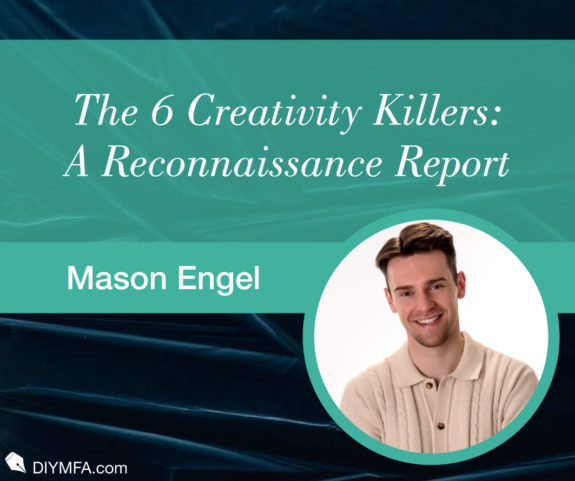The 6 Creativity Killers lurk around every corner. They steal your time, drain your energy, and stop your writing cold.
What follows is a reconnaissance report on these enemies. Read with caution, write with bravery, and arm yourself with these little-known defenses against the 6 Creativity Killers.
Killer #1: Self-Criticism
Defense: Conquer your inner critic
What does your inner critic tell you? What sick nothings does it whisper in your ear? Listen to the voice and write down what it says, then look at what you’ve written down and translate the language.
Let’s look at an example.
Your inner critic might say: “You’re no good. You’re kidding yourself. You’re an imposter.”
Translated, the self-critic’s words become “When I reread that passage and realized it’s not as exciting as I remembered it being, I felt scared, because I need to be completely confident in this novel before self-publishing. Can we try to make that passage better?”
Broken down into these terms, your inner critic shrinks from an imposing bully to a frightened worrywart. Now you can have empathy for it, and you can have empathy for yourself.
Killer #2: Busyness
Defense: Write in small chunks
You might be too busy to write for hours at a stretch, but don’t let Busyness win. Condense your writing time into micro sprints.
First, separate your thinking time from your writing time (if you have only 10 minutes to write, you can’t afford to spend the first 5 brainstorming). Plan your next writing session at times in the day when you can’t write but can think (re: toilet time, shower time, driving time).
After you have a writing road map, make writing your default “dead time” activity. Dead time comes in batches of 5-10 minutes when you’re in the pickup line at little Timmy’s preschool, or during a group call at work when you won’t be required to talk.
Most people think 5-10 minutes isn’t enough time to start a task, so they scroll social media or listen to the radio or stare off into the distance. But that’s a trap.
Keep your WIP on Google Drive so you can write from your phone if necessary, and use these 5-10 minute chunks of dead time to crank out some words.
Killer #3: Stress
Defense: Become antifragile
Meditation, gratitude journals, workouts, and dozens of other activities can relieve you of stress. But sometimes nothing you do works. Then, it’s time to be antifragile.
There was a chess prodigy named Josh Waitzkin who used to get songs stuck in his head while he played. He would divert his concentration from the chess match to getting rid of the melody, but sometimes it just wouldn’t leave.
What was his solution?
He stopped trying to get rid of the songs. If the melody stuck in his head was fast, he played more aggressively. If the melody was calm and musing, so was his strategy on the board. Instead of trying to avoid stress, he used it. He wasn’t at risk of being broken by stressors; he grew because of them. He became antifragile.
See the Creativity Killer of Stress not as an enemy, but as an unknowing ally. Use it to your advantage, as fuel and as source material, and your writing will never again suffer at its hand.
Killer #4: Marketing Anxiety
Defense: Insulate yourself from future worry
Imagine this. You learn from what happened yesterday, you set goals that extend several tomorrows forward, but you’re insulated from future worries (including those about selling your book), because you exist completely in today.
Sounds great, right?
But how in the world can we be so grounded in the present?
One method involves exporting your anxiety. Take 20 minutes and write down everything you’re worrying about. Then, for each worry, ask yourself what the worst-case scenario is.
For example, if your writing goal is to be traditionally published, you may worry about the process of trying to get an agent. What’s the worst-case scenario? Every query you send out will be rejected.
Accept that possibility, recognize that the consequence, though painful, will not kill you, and brainstorm solutions. Could you work with a query specialist? Could you save up for conventions that would allow you to connect with agents in person?
Taking small actions—or even making small plans—will loosen the worry’s grip on you.
Killer #5: Fatigue
Defense: Create enjoyable writing sessions
What requires more energy: a 2-mile walk to the gym or a 2-mile walk to the ice cream shop?
It’s easier to summon energy for pleasure than for pain. Consequently, if you craft your writing sessions to be more pleasurable than painful, you’ll find a deeper well of energy for it.
Step one in creating an enjoyable writing session is to “creatify” your writing environment. Put up some plants, some candles. Hang a curtain divider from the ceiling to create yourself a little nook. Find a comfortable chair. Play relaxing rainforest sounds in your headphones. Build yourself a happy place.
After creatifying your writing nest, it’s time to tackle your writing process. To ensure optimal enjoyment of your writing, you can find a writing partner, dress comfier while you write, drink a glass of wine or sparkling water…anything that helps transform your writing from a chore into a treat.
These feel like surface-level improvements, but they’ll combine to fill your writing with pleasure. Your energy will rise as a result, and your fatigue will fall.
Killer #6: Distraction
Defense: Recover your focus as fast as lightning
There are apps and focus techniques that can help you avoid distractions. But sometimes those things don’t work. The challenge becomes this: how do you resume your writing after the unavoidable interruption?
The answer is to ring the bell.
You’ve heard about that guy Pavlov and his dogs, right? He rang a bell every day before feeding time and the dogs salivated in anticipation. Eventually, he could ring the bell without feeding the dogs at all and they would still salivate.
What’s the bell for your writing?
What will instantly put you into a creative mindset or return you to a creative mindset after an interruption? Is it a particular chair? A candle scent? A type of music?
If you can find your bell—or if you can create a bell—you can turn your writer-mind on and off like a switch.
One more secret about Creativity Killers…
These defenses will protect you from the Creativity Killers, but you might find yourself struggling with the same one or two killers. Why? What makes you vulnerable to those killers, and how can you escape their influence?
There are six components of creative wellbeing, and if one of your components is weak, you’ll always be susceptible to the corresponding Creativity Killer.
For years I’ve been building a creativity-supercharging video course, and I’m only just now releasing it. That means you can take the creativity assessment, diagnose your vulnerabilities, and protect yourself from the Creativity Killers for good. And because this course is just hitting the market, you can do it all for free.
To apply for this free, creativity-supercharging video course, click here.
Tell us in the comments: What Creativity Killers do you suffer from? And how will you defeat them?
 Mason Engel is the Amazon-bestselling author of 2084, the director of bookish documentaries for public television, and the founder of ClimbWrite.com. ClimbWrite’s video courses are designed for fiction writers who are looking to supercharge their creativity and pen the next bestseller.
Mason Engel is the Amazon-bestselling author of 2084, the director of bookish documentaries for public television, and the founder of ClimbWrite.com. ClimbWrite’s video courses are designed for fiction writers who are looking to supercharge their creativity and pen the next bestseller.
You can find him on his website or follow him on Instagram.







